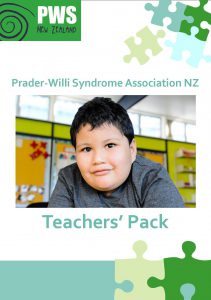School Support
All pupils with PWS require some level of additional support at school and many children receive ORS funding or School High Health Needs Funding. The areas in which support will be required include learning, behaviour and safety around food.
LEARNING
Some children score within normal range in cognitive testing (borderline to low average), but most children will have mild to moderate intellectual disability. Regardless of intellectual ability, all children experience some learning difficulties. In spite of this, pupils with PWS are usually hard-working, enthusiastic learners who are keen to succeed.
Tips for Teaching and Learning
- Visual learners – use visual aids
- Difficulty with abstract concepts – use concrete examples and systematic approaches / methods with steps
- Poor auditory processing and memory – allow extra processing time, use clear and unambiguous language, avoid lengthy instructions and check understanding
- Poor working memory – avoid multi-tasking and assist with taking notes
- Good long term, but poor short term memory – use repetition
- Expressive language delay – verbal ability may be good, but articulation difficulties can continue, and sometimes apraxia. Allow extra time for communicating and to practise new words.
- Impaired executive functioning – use visual schedules, checklists, break tasks into smaller steps, minimise distraction and plan ahead / prepare for changes in task / activity
- Low muscle tone and motor difficulties / dyspraxia – use assistive technology, allow for fatigue, consider sensorimotor issues and plan for development of gross motor skills
- Sociable, but poor social skills – provide support in group activities and facilitate social connection
- Please refer to the Abilities and Learning section of our Teachers’ Pack for further information.
BEHAVIOUR
Children with PWS like rules and consistency and can therefore thrive in the school environment. Nevertheless, understanding the underlying anxiety and stress sensitivity in PWS are key to preventing any unwanted behaviours. An increase in anxiety may directly correspond to an escalation in behaviours such as obsessive thinking, rigidity and non-compliance. As emotional control is impaired by the disorder of the hypothalamus in PWS, it is therefore essential to manage the classroom environment in order to reduce stressors and minimise anxiety.
Pupils with PWS do not learn from negative behavioural consequences or respond well to consequences that might work well for other pupils. However, they do respond well to positive behaviour management.
Tips for Behaviour Management
- High preference for routine and predictability – use visual schedules, clear expectations, avoid confusion and uncertainty, forewarn of changes and reward flexibility
- Difficulty in thought and task switching – use visual cues, countdowns, modify task lengths and set time limits for talking on a topic. If repetitive questioning occurs with rising anxiety, answer specifically, reassure, check understanding, then redirect or limit number of questions.
- Stubbornness and oppositional response – can be a ‘flight or fight’ response due to anxiety, or a coping device when their reasoning for refusal cannot be explained, perhaps even to themselves – provide preferential choices to allow a sense of control, allow processing time, be consistent, offer empathy and avoid negative reactions
- Tenuous emotional control – avoid false expectation and disappointment, encourage communication and assist with identifying emotions and taking appropriate action. Use a calm down area or tools, praise efforts to control emotions, avoid reasoning attempts if ‘meltdown’ occurs and reflect later on when they are ready.
- Sensory processing difficulties – pupils may be over-sensitive to stimuli or under-sensitive sensory seekers, or both – consider seating, locker placement, use of hand fidget tools, limit distraction and avoid sensory overload, i.e. noise, crowds, chaotic environments and being spoken to for too long / information overload
- Socially inappropriate behaviour – pupils may lack social awareness of what is appropriate in some situations, so clear rules are needed. Model, cue and frame social interactions to build social / conversational skills.
- Please refer to our Behaviour page and the Behaviour Management section of our Teachers’ Pack for further information and resources.
FOOD MANAGEMENT
Individuals with PWS have an altered body composition so their dietary intake needs to be reduced from around 2 yrs old to avoid rapid weight gain. However, they also develop an increased appetite from around age 4.5yrs and hyperphagia from around age 8 (abnormal desire for food / excessive appetite). This drive to eat can preoccupy the mind, raise anxiety and distract their focus from play and learning. A method called ‘Food Security’ not only controls weight by preventing unauthorised access to food, but also reduces associated food anxiety and behaviour. By storing food securely and using this method, expectations are not raised and temptation is removed from sight and mind.
NO DOUBT (predictable food routine) + NO HOPE/CHANCE (no opportunities for access to food & no unplanned extras) = NO DISAPPOINTMENT
Another important reason for controlling access to food is to prevent the possibility of a large volume of food being quickly consumed which increases the risk of choking or a perforated stomach lining. Supervision around food is necessary.

Tips for Achieving Food Security at School
- Opportunities for unauthorised access to food are eliminated, i.e. inaccessible area for lunchboxes, lunchtime supervision.
- All staff understand the dietary needs and supervision requirements of the child with PWS.
- All pupils know not to share food and to be consistent in saying no to the child with PWS if they ask for food.
- No suggestions or promises of extras are made; food treats are not used as incentives / rewards.
- The pupil is aware of the schedule for morning tea and lunch and is forewarned if any changes to the food schedule are made.
- The older child does not have access to money to buy food without permission. They are supported to make appropriate, healthy choices when this is allowed.
- The family are consulted about occasions involving food. (They may provide alternative food or avoid the occasion – some families avoid sweet foods altogether due to their addictive nature and diabetes risk in PWS.)
- The dietary needs of the child with PWS are considered in class or school events in the same way they are for pupils with serious food allergies. (Families also appreciate it when schools adopt a healthy eating or food free approach to fundraising, birthdays etc.)
ADDITIONAL RESOURCES
- Download our Teacher Pack, or to order a copy, please visit our Publications and Resources page.
The pack also contains an editable A4 pupil profile template to share with school staff and relievers.

- Young Students with PWS: The Preschool Years – Information for Educators, by PWSA(USA)
- The Young Child with PWS: Physical and Sensory Issues and Recommendations – Janice M. Agarwal, PT, CNDT, 2014
- Tips for Teachers Tool Box – slides accompanying Tips for Teachers video above, by Elizabeth Roof
- Learning with Prader-Willi Syndrome – VIDEO by PWS Australia, 2016
- How Does a Person With PWS Think? – PWSA(USA)
- Anxiety and PWS – PWSA(NZ)
- Principles of PWS Behaviour Management – PWSA(USA)
- PWS Behaviour Management Strategies Tool Kit – Prader-Willi Calfornia Foundation
- FamCare Resources i.e. Managing a Meltdown in People with PWS, Coping with Change – by IPWSO
- Core Therapeutic Interventions for the Child with PWS – a pamphlet by PWCF
- Don’t Stop Speech Therapy – article by Lisa Graziano, PWSA(USA). Includes information on apraxia.
- Speech and Language Disorders Associated with PWS – Barbara A. Lewis
- Improving Social Skills in PWS – VIDEO by Elizabeth Roof, Vanderbilt Kennedy Center (read a summary here)
- IEP Accommodations: Sample Templates for Social Skill Deficits – Barbara Dorn, PWSA(USA)
- Education and Social Issues for Adolescents with PWS – Professor B.J. Goff
- Food is Never OK in the Classroom – from The Gathered View (ISSN 1077-9965), PWSA(USA), 2006
- Telling Classmates about Your Child’s Disability – PACER Center ACTion Information Sheet
